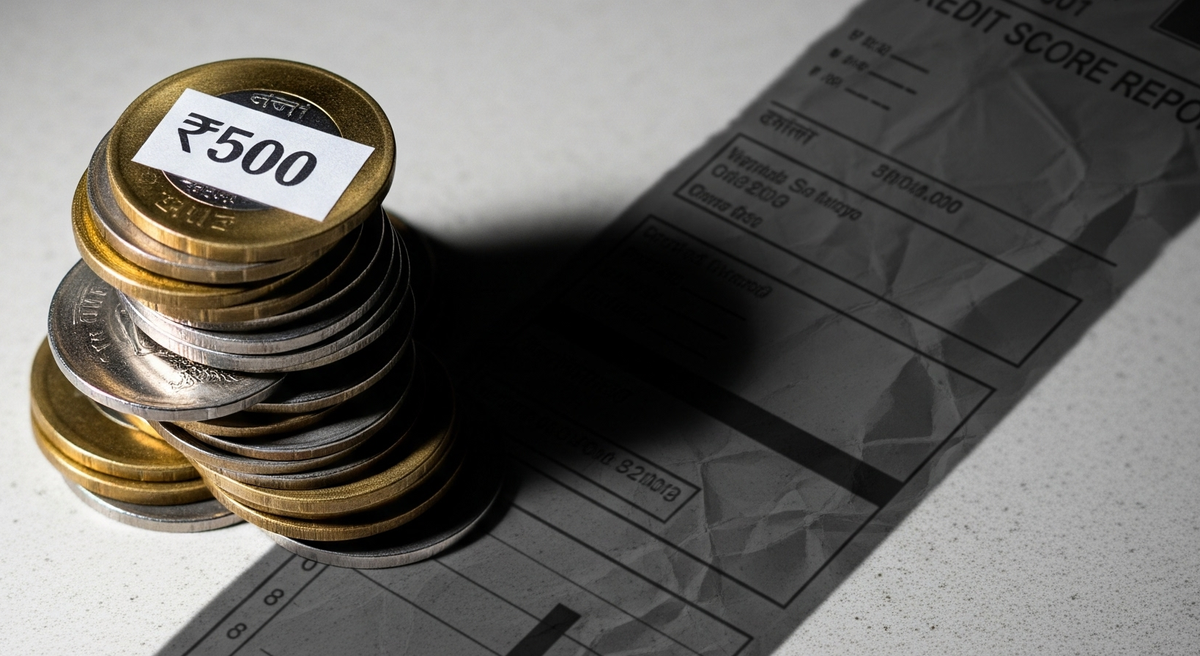Will a ₹500 Missed EMI Ruin Your Credit Score Forever?

When it comes to credit scores, every Indian borrower has one big fear — “Agar maine ek chhota sa EMI miss kar diya, toh kya mera credit score hamesha ke liye kharab ho jayega?”
This fear is especially common for small-ticket EMIs — like ₹500 for a consumer durable loan, a low-limit credit card, or a BNPL installment. After all, ₹500 feels like nothing compared to bigger loans, right? But when it comes to your credit report, even the smallest defaults can leave a mark. The real question is: Does one missed EMI permanently damage your creditworthiness, or is there a way to recover? Let’s break it down.
Why Even a ₹500 EMI Matters
Your credit score (CIBIL, Experian, Equifax, CRIF) doesn’t care how big or small your EMI is. What it tracks is your repayment behaviour. From the bank’s perspective, someone missing ₹500 is as much of a risk signal as someone missing ₹50,000 — because it shows a pattern of non-repayment.
The credit bureau records the Days Past Due (DPD), which shows how late you were on that payment:
- 0 DPD → On time
- 30 DPD → Payment missed for 30 days
- 60/90 DPD → Long-term default
So even if it’s ₹500, if your lender reports you as 30+ days late, it gets recorded in your credit history. And that can lower your credit score.
Immediate Impact on Your Credit Score
Here’s what usually happens when you miss even one small EMI:
- Short-term dip: Your credit score may drop anywhere between 50–100 points, depending on your profile. For someone with a strong 780+ score, a single miss might bring it down to 720–740.
- DPD tag: Your report will show “30 DPD” for that account, which lenders notice instantly.
- Risk perception: Lenders don’t see the amount. They only see that you missed. Even if it’s ₹500, it raises doubts about your repayment discipline.
Long-Term Consequences
The good news is that one small miss does not ruin your credit score forever. But the bad news is that its footprint stays on your report for years.
- For 2–3 years, lenders may still see that one late payment.
- If you keep missing small EMIs repeatedly, the effect compounds, and your score may keep sliding.
- If your profile is thin (like only 1 credit card or 1 small loan), a single miss has a much higher impact compared to someone with a long credit history.
In short: It’s not permanent damage, but it can make your next loan/credit card approval tougher in the near future.
Does the Bank Care About the Amount?
This is the tricky part. Lenders look at:
- Repayment discipline → Have you missed payments before?
- Recency → Was the miss recent or 2 years ago?
- Pattern → Was it one-off or frequent?
So no, they don’t care if it’s ₹500 or ₹50,000. They care about whether you honoured your commitment. For banks, trust matters more than the ticket size.
How to Recover After a Missed EMI
The story doesn’t end with one small mistake. You can fix it if you act smartly:
- Pay Immediately: If you realise you’ve missed, pay ASAP. Even if it’s a few days late, it may not get reported if you clear it quickly.
- Avoid 30+ DPD: Most bureaus only mark late payments if they cross 30 days. Paying within the same billing cycle can save you.
- Maintain discipline after: Six to twelve months of on-time payments can fully repair the small dip.
- Diversify credit: Having multiple active accounts (card + loan) reduces the weight of one late payment.
- Check your report: Always review your CIBIL or Experian report to confirm if the miss was recorded.
Myth vs Reality: ₹500 Miss EMI
- Myth: Small EMIs don’t matter.
- Reality: Size doesn’t matter. Behaviour does.
- Myth: One EMI miss destroys your credit score permanently.
- Reality: Impact is temporary, usually recoverable within a year of good repayment.
- Myth: Banks ignore small-ticket defaults.
- Reality: Banks check repayment history, not the EMI amount.
Final Word
A ₹500 missed EMI won’t ruin your credit score forever — but it can leave a temporary stain that makes lenders cautious. Think of your credit score like your reputation. Even a small slip can cause doubts, but consistent responsible behaviour over time rebuilds trust.
So, whether it’s ₹500 or ₹50,000, never ignore an EMI. Pay on time, every time, and your credit score will always stay in your favour.